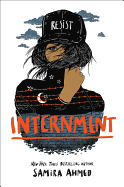
In Internment, Samira Ahmed (Love, Hate and Other Filters) paints a chilling vision of a not-too-distant-future dystopian United States.
Ever since the president was elected, there have been changes: the Muslim ban, a Muslim registry, book burnings and, finally, the authorization of the Exclusion Laws. Layla's father, a professor and poet, sticks to his belief that Taqqiya (concealing one's religion) should only be used during a time of duress; not believing they are in a life-threatening situation, he registers the family as Muslim on the census. As a result, the family is targeted. Layla's father loses the job "he'd had for over a decade" and, due to the stigma around interfaith relationships, Layla is forced to meet in secret with her Jewish boyfriend, David.
The story turns even darker when, in the dead of night, Layla and her family are abducted by armed men. They are taken to Camp Mobius, an internment facility for Muslims believed to be political dissenters. The motto of the camp --"Unity. Security. Prosperity"--drips with irony: to foster division, the government has organized Mobius by ethnicity. Under severe surveillance, Layla enlists allies to help her resist in any way she can.
Ahmed captures an authentic teen voice in strong, passionate Layla. In evocative language, she uses parallel experiences in the U.S.'s painful history to entrench the reader in Layla's terrifying story. Ahmed also skillfully uses poetry throughout as both a tool of resistance and a tie between Layla and her father. Internment explores forbidden romance and expertly highlights how prejudice can be used systematically to oppress, illustrating how easily people will turn a blind eye to injustice. Ahmed's work and Layla's battle showcase the importance of resisting in the face of oppression. --Tasneem Daud, blogger and booktuber, Nemo Reads

